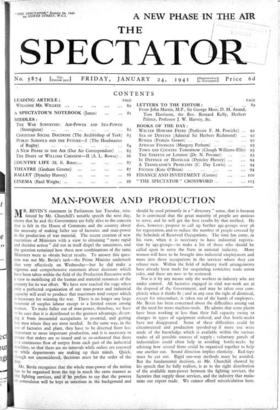MAN-POWER AND PRODUCTION
MR. BEVIN'S statement in Parliament last Tuesday, rein- forced by Mr. Churchill's notable speech the next day, shows that he and the Government are fully alive to the concern that is felt in the House of Commons and the country about the necessity of making fuller use of factories and man-power in the production of war material. The recent creation of new executives of Ministers with a view to obtaining "more rapid and decisive action" did not in itself dispel the uneasiness, and the question remained how these new combinations of the same Ministers 'were to obtain better results. To answer this ques- tion was not Mr. Bevin's task—the Prime Minister undertook that very effectively on Wednesday—but he did make a vigorous and comprehensive statement about decisions which have been taken within the field of the Production Executive with a view to mobilising all the human and material resources of the country for its war effort. We have now reached the stage when only a perfected organisation of our man-power and industrial capacity will avail to produce that maximum total output which is necessary for winning the war. There is no longer any large reservoir of surplus labour except to a limited extent among women. To make fuller use of man-power, therefore, we have to be sure that it is distributed to the greatest advantage, divert- ing it from inessential occupations to essential, and getting key men where they are most needed. In the same way, in the use of factories and plant, they have to be diverted from less important to more important production, and it is necessary to insure that cirders are so issued and so co-ordinated that there is a continuous flow of output from each part of the industrial machine, so that there are no intervals while orders are renewed or while departments are making up their minds. Quick, though not unconsidered, decisions must be the order of the day.
Mr. Bevin recognises that the whole man-power of the nation has to be organised from the top in much the same manner as the fighting services, and if he prefers to say that the powers of compulsion will be kept as sanctions in the background and should be used primarily in a " directory " sense, that is because he is convinced that the great majority of people are anxious to serve, and he will get the best results by that method. He does, however, propose to call up further age-groups over 36 for registration, and to reduce the number of people covered by the Schedule of Reserved Occupations. The time has come, in his view, when it is necessary to have industrial registra- tion by age-groups—to make a list of those who should be called upon to serve the State in national industry. More women will have to be brought into industrial employment and more into those occupations in the services where they can release men. Within the field of industry itself arrangements have already been made for suspending restrictive trade union rules, and these are now to be reviewed.
Nor is it by any means only the workers in industry who are under control. All factories engaged in vital war-work are at the disposal of the Government, and may be taken over com- pletely when it thinks fit ; and in any case the right of dismissal, except for misconduct, is taken out of the hands of employers. Mr. Bevin has been concerned about the difficulties arising out of the need for more machine-tools. He admits that some plants have been working at less than their full capacity owing to changes in types of equipment ordered, and that bottle-necks have not disappeared. Some of these difficulties could be circumvented and production speeded-up if more use were made of the knowledge which is available within the various trades of all possible sources of supply ; voluntary panels of industrialists could often help in avoiding bottle-necks by advising how several firms could be organised together to help one another out. Sound direction implies elasticity. Red-tape must be cut out. Rigid one-way methods .must be avoided. But the fundamental decision, as Mr. Churchill showed by his speech that he fully realises, is as to the right distribution of the available man-power between the fighting services, the factories that supply those services, and the industry that main- tains our export trade. We cannot afford miscalculation here.






























